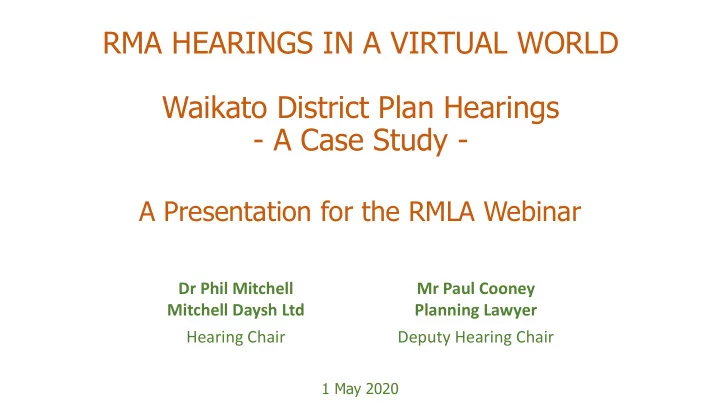

RMA HEARINGS IN A VIRTUAL WORLD Waikato District Plan Hearings - A Case Study - A Presentation for the RMLA Webinar Dr Phil Mitchell Mr Paul Cooney Mitchell Daysh Ltd Planning Lawyer Hearing Chair Deputy Hearing Chair 1 May 2020
Presentation Structure Background information ❑ Key principles ❑ Process followed ❑ Learnings and observations ❑
Background Hearings on proposed Waikato District Plan commenced in October ❑ 2019 and will conclude in mid-2021. Panel of 7 appointed (2 independents, 2 tangata whenua and 3 ❑ councillors). Most hearings heard by 4 commissioners – Chair, Deputy Chair, 1 x ❑ tangata whenua, 1 x councillor. Hearings held on a topic by topic basis – not submitter by submitter. ❑ Decisions will be issued at the conclusion of all hearings. ❑
Background (cont.) Detailed Directions issued requiring sequential pre-circulation of all written ❑ material: Commencing with section 42A report (5 weeks before the hearing): and ❑ Ending with legal submissions and witness summary statements (3 working days before the ❑ hearing). Lay submitters not required to pre-circulate information, but encouraged to do so. ❑ All information to be “taken as read”, with counsel, witnesses and lay submitters ❑ limited to presenting 10 minute summaries – unless leave sought to increase it. Hearings to focus on areas of disagreement and identifying solutions, not problems. ❑ Parties encouraged to work offline to develop / refine solutions. ❑ Will incorporate National Planning Standards into decisions version to the greatest ❑ extent possible.
Background (cont.) COVID Level 4 lockdown announced on 22 March 2020. ❑ Section 42A report and evidence for 3 hearings were in preparation for ❑ hearings set down for April. Panel immediately convened (virtually) to determine if we ❑ could/should defer all hearings or proceed virtually.
Key Principles No definitive guidance at that time as to what a “hearing in public” (section ❑ 39 of the RMA) meant, either in the RMA or elsewhere. Panel also felt strongly that if we “could make something work”, that would ❑ be preferable to stopping altogether for an indefinite period of time. After extensive discussion and having sought legal advice, Panel went back ❑ to first principles, particularly the principles of natural justice. Concluded that a virtual hearing could be appropriate , provided that it ❑ was fair to all participants, transparent, information was readily available and the process was participatory in nature. Also concluded that having internet video and audio and phone-in options, ❑ plus video and audio recordings, made for an open hearing.
Process Panel issued a Minute on 27 March 2020 explaining that preference was to ❑ proceed virtually, but that: There would be no compunction to attending virtually; ❑ Hearings would be recorded and posted on online in video and audio formats; ❑ We would hear from submitters face to face at a later date, if that was their wish ❑ (this would not an option for a resource consent hearing); and Invited comments from all parties. ❑ Approach was reinforced by the amendment to section 47 of LGOIMA ❑ enacted the day before (i.e. on 26 March 2020). But even without legislative backing, Panel was confident that the process ❑ was appropriate and fair. Response from Council staff and submitters was overwhelmingly in favour of ❑ proceeding, although small numbers were opposed in principle and/or opted for a face to face hearing at a later date.
Process (cont.) Panel issued Directions on 3 April 2020 confirming that the three ❑ hearings scheduled for April would occur on a virtual basis, as a trial, following which the situation would be reviewed. Three hearings have been undertaken and feedback has been ❑ universally positive. A fourth virtual hearing has now been confirmed. ❑ Submitters will not be able to “opt out” of virtual attendance this time, ❑ BUT: They can attend by phone if they prefer; and ❑ Provided COVID restrictions allow, a computer will be made available at the ❑ local library.
Learnings and observations Have been able to host 100 parties at each virtual hearing. ❑ Technology (Zoom and YouTube) has performed flawlessly. ❑ Highly participatory, and arguably more so than many conventional hearings, where ❑ if you’re not present you don’t know what happened. Ideally suited to all but (possibly) the largest hearings. ❑ Screen sharing allows presentations / maps etc to be clearly seen by all, including ❑ those watching the video recording. It didn’t arise, but easy to control inappropriate behaviour – no need to issue ❑ warnings/call security etc, just terminate the individual’s connection. ☺☺ A genuine option, post-COVID, as it is both effective and extremely time-efficient. ❑ (It also avoids travel and accommodation costs.)
Recommend
More recommend